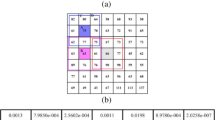Abstract
A novel image segmentation method based on modified fuzzy c-means (FCM) is proposed in this paper. By using the neighborhood pixels as spatial information, a spatial constraint penalty term is added in the objective function of standard FCM to improve the robustness. Meanwhile, the neighbor pixels information is used selectively to reduce computing time and iterations. Experiments on real images segmentation proved the availability of the improvement.
This work is supported by the National Natural Science Foundation of China No.60773062, the Natural Science Foundation of Hebei Province of China No.F2009000215 and Scientific Research Plan Projects of Hebei Educational Bureau No.2008312.
Access this chapter
Tax calculation will be finalised at checkout
Purchases are for personal use only
Preview
Unable to display preview. Download preview PDF.
Similar content being viewed by others
References
Dunn, J.C.: A fuzzy relative of the ISODATA process and its use in detecting compact well separated cluster. J. Cybernet. 3, 32–57 (1973)
Bezdek, J.C.: Pattern Recognition with Fuzzy Objective Function Algorithms. Plenum Press, New York (1981)
Bezdek, J.C.: A Convergence Theorem for the Fuzzy ISODATA Clustering Algorithm. J. IEEE PAMI 1, 1–8 (1980)
Liao, L., Li, B.: MRI brain image segmentation and bias field correction based on fast spatially constrained kernel clustering approach. Pattern Recognition Letters 29, 1580–1588 (2008)
Sikka, K., Sinha, N.: A fully automated algorithm under modified FCM framework for improved brain MR image segmentation. Magnetic Resonance Imaging 27, 994–1004 (2009)
Das, S., Kanor, A.: Automatic image pixel clustering with an improved differential evolution. Applied Soft Computing 9, 226–236 (2009)
Ahmed, M.N., Yamany, S.M., Mohamed, N., Farag, A.A., Moriarty, T.: A modified fuzzy c-means algorithm for bias field estimation and segmentation of MRI data. IEEE Trans. Med. Imaging 21, 193–199 (2002)
Chen, S.C., Zhang, D.Q.: Robust image segmentation using FCM with spatial constraints based on new kernel-induced distance measure. IEEE Transaction on System, Man, and Cybernetics B 34, 1907–1916 (2004)
Author information
Authors and Affiliations
Editor information
Editors and Affiliations
Rights and permissions
Copyright information
© 2010 Springer-Verlag Berlin Heidelberg
About this paper
Cite this paper
Li, K., Cao, Z., Cao, L., Liu, M. (2010). An Improved FCM Algorithm for Image Segmentation. In: Yu, J., Greco, S., Lingras, P., Wang, G., Skowron, A. (eds) Rough Set and Knowledge Technology. RSKT 2010. Lecture Notes in Computer Science(), vol 6401. Springer, Berlin, Heidelberg. https://doi.org/10.1007/978-3-642-16248-0_75
Download citation
DOI: https://doi.org/10.1007/978-3-642-16248-0_75
Publisher Name: Springer, Berlin, Heidelberg
Print ISBN: 978-3-642-16247-3
Online ISBN: 978-3-642-16248-0
eBook Packages: Computer ScienceComputer Science (R0)




